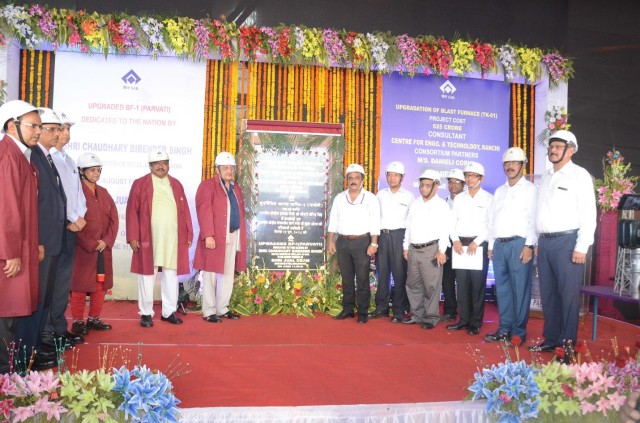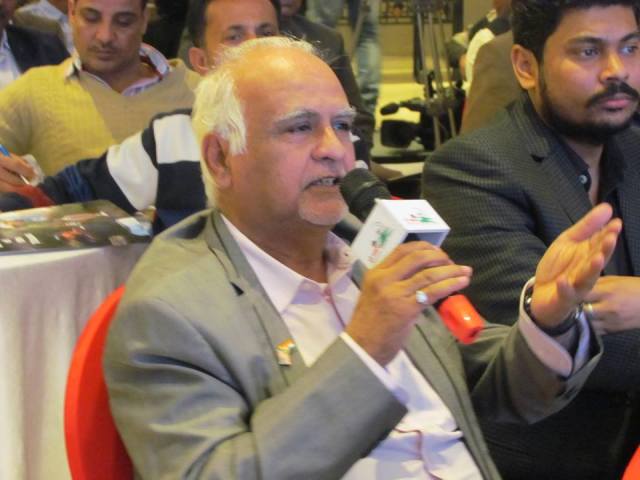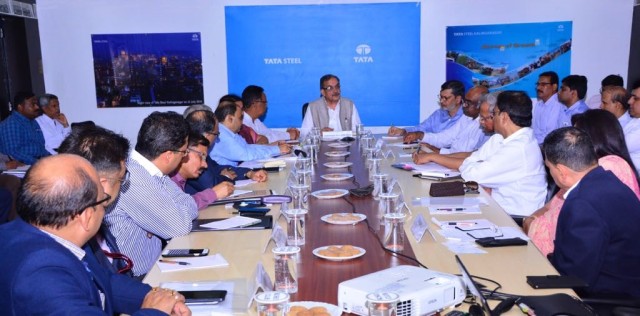Patna Pirates retain their Star Kabbadi players
Patna Pirates retain their Star Kabbadi players; the fresh talents to add a new dimension to the champion squad
New Delhi, June 2, 2018: VIVO Pro Kabaddi, India’s biggest non-cricket sports league, concluded the Season 6 Player Auctions on a historic note. Patna Pirates, the defending champion of Vivo Pro Kabbadi league retained their star players for Season 6. Pardeep Narwal “Dubki King” will continue to be team’s strength and star attraction for Kabbadi fans while representing Patna Pirates. Defender Jaideep, Manish, and all-rounder Jawahar have been retained by Patna Pirates for Season 6. They together will lend their experience to the team during Vivo Pro Kabbadi League Season 6 beginning October 19, 2018, with a hope to retain the champion title.
Patna Pirates has always planned a winning squad by keeping a balance between experienced star players and new talents. Taking ahead this formation, Patna Pirates has included all-rounder Vijay, Praveen, and Arvind as the three new young players in the squad who will add immense value to the team during competitive matches.
Patna pirates have strategically planned their auction bid and picked-up two international players for approx. Rs 20 lacs for Season 6. Taedeok and Hyunil Park went under the hammer for Rs 11.4 Lac and Rs 8.0 lac respectively.
The management also bided for Indian players and picked Kuldeep Singh (All-Rounder) for 22 lac, Vikas Jaglan (All-Rounder) for Rs 8 lac, Deepak Narwal (Raider) for Rs 57 lac, Surender Singh (Raider) for Rs 12.25 lac, Tushar Patil, (Raider) for 20 Lac, Manjeet (Raider) for Rs 20.4 lac , Vikas Kale (Defender) for Rs 27.4 lac, Ravinder Kumar (Defender) for Rs 8 lac and Vijay Kumar (Defender) for Rs 8 lac. Patna Pirates will be guided by its veteran coach Shri Ram Mehar Singh who has played an instrumental role in retaining the title.
Mr Pawan S Rana, Chief Executive Officer, Patna Pirates commenting on the auction said “Patna Pirates has always focused on the quality of the game and strived to raise the standard of Kabbadi. Our players have always thrilled sports lover through mental and physical skills during highly competitive matches. We have retained our star players while bringing in fresh talents to add a new dimension to our team. We are confident of retaining our title in Season 6”.
Patna Pirates had performed consistently in all their league appearances with the only team to reach playoff matches in all 5 seasons and winning the title thrice in a row.
NAPM expresses solidarity with the demands of Gramin Dak Sevaks t
NAPM expresses solidarity with the demands of Gramin Dak Sevaks to implement Kamlesh Chandra Committee Report
Govt. of India must ensure dignified pay scales, benefits & regularization of services of Gramin Dak Sevaks, who are the backbone of rural communication in India
1st June, 2018: National Alliance of People’s Movements extends its support to the struggle of All India Gramin Dak Sevaks Union (AIGDSU)’s and their demand to implement the recommendation of Kamlesh Chandra Committee Report on Gramin Das Sevaks. Rural India Post Employees (known as Gramin Dak Sevaks) have been on a nationwide protest since 22nd May, 2018 under the banner of All India Gramin Dak Sevaks Unions. While the said Committee submitted its report on 24th November, 2016, it was published after two months and that too after an indefinite hunger strike call given by National Federation of Postal Employees, All India Postal Employees Union GDS and other organizations.
The government has delayed the implementation of the recommendations of the Committee for about 2 years now. Protesting non-implementation of the Kamlesh Chandra Committee’s recommendations and the Seventh pay Commission norms for Gramin Dak Sevaks working in rural areas, Postal staff have been demonstrating in front of several post offices including the head branches in Odisha, Punjab, Jammu & Kashmir, Uttarakhand, Himachal Pradesh, Karnataka, Tamil Nadu, Kerala and other states as well.
Despite the all round inflation, Dak Sevaks are paid salary only Rs. 6,000 -7,000. Even after working for 20-25 years, they are not considered as permanent employees and are not eligible for many other benefits due to government employees. It was in the light of this situation that Kamlesh Chandra Committee had recommended minimum scale of Rs. 10,000 for 3 hours, Rs. 12,000 for 4 hours and Rs. 14,500 for 5 hours work, 3 promotions (financial up gradation) on completion of 12, 24 and 36 years of service, maternity leave for 6 months and paternity leave for a week, Children’s education allowance and support for hiring accommodation, office maintenance, electricity charges etc.
Despite numerous technological and communication related strides, the postal department plays an important role even today, particularly in rural areas across the country and the Grameen Dak Sevaks are at the heart of these services. It is both unfortunate and unacceptable that the human resource which serves as the backbone of the rural communications system is kept deprived and the entire postal department itself is structurally and systematically sidelined, due to increasing privatization of postal services and a flawed global-capitalist friendly economic policy of the State.
National Alliance of People’s Movements stands in solidarity with many of the long-standing and genuine demands of the Grameen Dak Sevaks and calls upon the Department of Posts and Ministry of Communication and Information Technology to acknowledge and fulfill their charter of demands to implement the recommendations of Kamlesh Chandra Committee and fix a time limit to regularize their services and make them permanent.
Alien INC – No Roti, Kapda, Makan, Water, Power, Transport+
June01, 2018 (C) Ravinder Singh progressindia2015@gmail.com
Surjewala appears to be closest to INC power center his article in TOI was very ordinary and then I saw RPN Singh engage in a DIRTY fight on TV Channels. I have also gone through INC shabby document ‘India Betrayed’ – I upload 100 Times more Data And INFO than Congress in spite of Age & Investment Limitation which are delivered to all Parties & Governments and NGOs all FREE – INC can’t even digest readymade info.
Why can’t Surjewala or Sibal or RPN Singh or Manish and others talk about Roti, Kapda, Wages, Makan, Bijli, Pani, Railways, Buses, Drinking Water Supply, Education to Children, Healthcare, Exports, Defense, Security or Law & Order and JOBS, Foreign Relations, MONEYLENDERS & MIDDLEMEN?
Ø Total Emoluments Growth in Last 4 Yrs of UPA was 94% almost Doubled from Rs.1,40,70 Cr to Rs.2,72,415 Cr than Dipped to 12.8% in FY2015
Today around 70% people are literate – or 80% Voters are Literate or Semi-Literate INC should talk to them with REAL Figures not just Manipulated Data.
When Ruler talk in numbers as its USP often pass of Inflated figures INC doesn’t respond at all – 7% or 8% GDP Growth doesn’t matter – here in Tables culled from RBI we can see out of Rs.5,93,900 Cr Non Food credit [NFC] growth in FY2017-18 – allocation to
Ø Agriculture was only Rs.37,800 Cr or just about 6% for 60% population
Ø Industry was even less Rs.19,500 Cr or 3.3% but Credit to
Ø Services was Rs.2,48,300 Cr or 42% of NFC and
Ø Personal Loans numbers were Rs.2,88,500 Cr which is more than 48% of NFC.
In 4 Years term NFC Credit growth was Rs.21,22,400 Cr but in this Credit Growth to
§ Agriculture was Rs.3,60,800 Cr, JUST 2% of GDP in 4 Years,
§ Industry was Rs.1,76,400 Cr, JUST 1% of GDP in 4 Years,
§ Services was Rs.7,13,599 Cr, JUST 4% of GDP in 4 Years, and
§ Personal Loans Rs.8,71,800 Cr, JUST 5% of GDP in 4 Years
RBI – Deployment of Gross Bank Credit by Major Sectors – Rs.Billions
SN | Sectors | Mar.22, 2013 – C | Mar.21, 2014 – D | % D/C | Mar.31, 2017 – A | Mar.30, 2018 – B | % B/A |
I | Gross Bank Credit (II + III) | 49642 | 56572 | 14.0% | 71345 | 77223 | 8.2 |
II | Food Credit | 946 | 912 | -3.6 | 400 | 338 | -15.5 |
III | Non-food Credit (1 to 4) | 48696 | 55660 | 14.3% | 70945 | 76884 | 8.4 |
1 | Agriculture & Allied Activities | 5899 | 6694 | 13.5% | 9924 | 10302 | 3.8 |
2 | Industry (Micro, Small, Medium Large ) | 22302 | 25229 | 13.1% | 26798 | 26993 | 0.7 |
3 | Services | 11519 | 13370 | 16.1% | 18022 | 20505 | 13.8 |
4 | Personal Loans | 8976 | 10367 | 15.5% | 16200 | 19085 | 17.8 |
Ravinder Singh, Inventor & Consultant, INNOVATIVE TECHNOLOGIES AND PROJECTS
Y-77, Hauz Khas, ND -110016, India. Ph: 091- 8826415770, 9871056471, 9650421857
Ravinder Singh* is a WIPO awarded inventor specializing in Power, Transportation,
Smart Cities, Water, Energy Saving, Agriculture, Manufacturing, Technologies and Projects
Delhi Energy Consumption Growth 18.9%, Load 29.8% 6 Yrs +
June02, 2018 (C) Ravinder Singh progressindia2015@gmail.com
Since Electricity Tariffs for Air-Conditioning Load is reduced this year, when AC Load draws PEAKING HIGH COST POWER should be charged as per peak demand linked tariff, there shall be unusual growth in Peak Load – yesterday i.e. June01, 2018 Peak was 6651 MW at 3:36 PM. Minimum load was 4359 MW at 7:03 AM.
When Electricity Energy consumption grew 29.8% in 6 Years from 5028 MW in Summer 2011 to 6526 MW last year – Energy demand growth was reasonable – 18.9% from26,751 MU to 31,825 MU. This is less than Population Growth.
Obviously there are OPTIONS to Cut Peak Demand.
1. Promote ROOFTOP Solars – subsidize upto 5 KW Off-Grid Systems. 2,00,000 Installations would add up to 1000 MW in FY2018-19. Rs.50,000 subsidy per installation to Cost Rs.1000 Cr – but Delhi shall save 1500 MU every year worth Rs.1000 Cr annually and avoid 2000 MW Capacity Additions to cost Rs.15,000 Cr or more on Power Projects, Transmission & Distribution network, same for FY2019-20.
2. Instead of Standard Time for All Shops & Private Offices – Shops on One Side may operate from 6AM to 3PM and other side 1PM to 10 PM. Stocking of Shops could be moved to Early Morning or Late Evening hours. This means SHOPPING LOAD is spread over 16 hours from 9 hrs presently [10:30AM to 7:30PM]
3. Identify 1000 MW of Generators spread over Delhi to provide PEAKING POWER by Switching to Own Generation for 2 hrs When Delhi Peak Demand Exceed 6000 MW than Load Shedding.
4. Distribute 5m LED Lamps & 5m Energy Efficient Ceiling Fans – Rs.200 Cr Subsidy @ Rs.100 for LEDs and Rs.300 for Ceiling fan – Reduce 400 MW Load saving Rs.6,000 Cr on New Power Plants, Transmission & Distribution.
Others Programs
5. Distribute 5 Stage UV Water Purifiers Cost Rs.1500 Each Free to 2m Consumers – Cost Rs.300 Cr shall reduce Water Lost in RO Systems, Same Electricity and Reduce Health Cost.
6. Storage Dams on Yamuna to Ensure CLEAN, BLUE Water Supply to Water Treatment Plants and To Consumers – 24 hour Water Supply.
7. Uninterrupted Power to Avoid Home UPS could save 2000 MU of Power.
8. Energy Efficiency to save 2000 MU to 4000 MU every year.
Ravinder Singh, Inventor & Consultant, INNOVATIVE TECHNOLOGIES AND PROJECTS
Y-77, Hauz Khas, ND -110016, India. Ph: 091- 8826415770, 9871056471, 9650421857
Ravinder Singh* is a WIPO awarded inventor specializing in Power, Transportation,
Smart Cities, Water, Energy Saving, Agriculture, Manufacturing, Technologies and Projects













































































